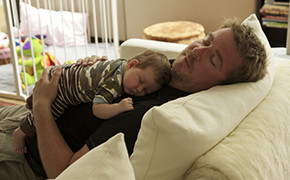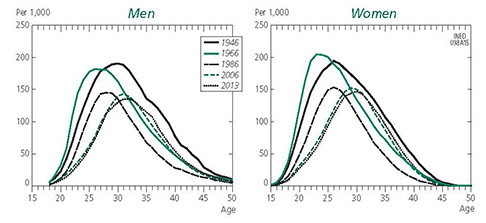Men have children later than women
Demographers have long been attentive to the age of women when their first child is born; fathers’ age is taken into account much less often. Comparing the two brings to light age differences in fertility behaviours, differences strongly linked to conjugality norms. A review and analysis of these data may be found in the Population chronicle on the demographic situation in France.
Age at birth of first child is rising for both mothers and fathers

In 2013 in France, the average age (average age is calculated on the basis of fertility rates by age) at birth of first child was 30.2 for women and 33.1 for men, but these figures have varied over time: in the late 1940s, the respective ages were 28.4 and 31.7 years. Average age at first birth fell in the 1970s, to 26.5 for women and 29.5 for men. The ages of highest fertility have also changed over the generations. For women in 2013, that age was 30 whereas in 1996 it was 23.

The age gap between mothers and fathers and within the couple has remained stable
The average age gap upon becoming a mother or father is three years and has not changed since 1946. It corresponds to the age gap between couple members: on average, in different-sex couples the man is older than the woman, and though the gap is narrowing slightly it has remained above two years. The age gap is greater in married couples than in civil unions.
Total number of children: a difference between men and women
Using the latest Famille et logements survey, conducted in 2011, we can estimate the proportion of childless persons aged at least 50 in France. The figure was 13.5% for women born between 1961 and 1965, and 20.6% for men of the same generation. Highly educated women, lowly educated men, and persons who have never lived in a couple are the groups most concerned. Men with little education were often excluded from the labour market, while highly educated women were often without a partner. In recent generations this trend is reversing for women. We can therefore expect that in the future, infertility will be greatest at the bottom of the social scale for both men and women. And in French society, living as a couple remains a relatively strong prerequisite for becoming a parent.
|
The findings presented here are based on civil registry data published by INSEE. They come from bulletins on all births on French territory that provide similar information on mothers and fathers. |
Source: Magali Mazuy, Magali Barbieri, Didier Breton, Hippolyte d’Albis, 2015, The Demographic Situation in France: Recent Developments and Trends over the Last 70 Years, Ined, Population, 70 (3)
Contact: Magali Mazuy
Online: march 2016
